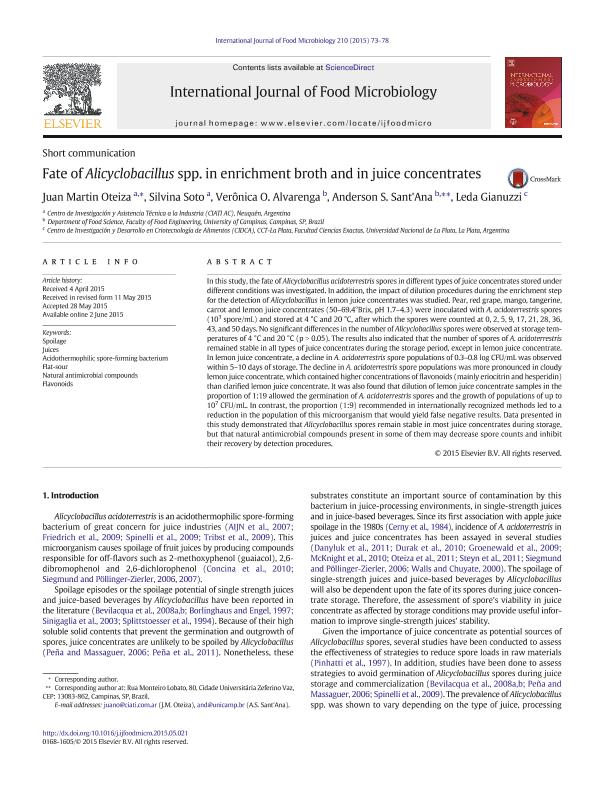Artículo
Fate of Alicyclobacillus spp. in enrichment broth and in juice concentrates
Fecha de publicación:
10/2015
Editorial:
Elsevier Science
Revista:
International Journal of Food Microbiology
ISSN:
0168-1605
Idioma:
Inglés
Tipo de recurso:
Artículo publicado
Clasificación temática:
Resumen
In this study, the fate of Alicyclobacillus acidoterrestris spores in different types of juice concentrates stored under different conditions was investigated. In addition, the impact of dilution procedures during the enrichment step for the detection of Alicyclobacillus in lemon juice concentrates was studied. Pear, red grape, mango, tangerine, carrot and lemon juice concentrates (50–69.4°Brix, pH 1.7–4.3) were inoculated with A. acidoterrestris spores (103 spore/mL) and stored at 4 °C and 20 °C, after which the spores were counted at 0, 2, 5, 9, 17, 21, 28, 36, 43, and 50 days. No significant differences in the number of Alicyclobacillus spores were observed at storage temperatures of 4 °C and 20 °C (p N 0.05). The results also indicated that the number of spores of A. acidoterrestris remained stable in all types of juice concentrates during the storage period, except in lemon juice concentrate. In lemon juice concentrate, a decline in A. acidoterrestris spore populations of 0.3–0.8 log CFU/mL was observed within 5–10 days of storage. The decline in A. acidoterrestris spore populations was more pronounced in cloudy lemon juice concentrate, which contained higher concentrations of flavonoids (mainly eriocitrin and hesperidin) than clarified lemon juice concentrate. It was also found that dilution of lemon juice concentrate samples in the proportion of 1:19 allowed the germination of A. acidoterrestris spores and the growth of populations of up to 107 CFU/mL. In contrast, the proportion (1:9) recommended in internationally recognized methods led to a reduction in the population of this microorganism that would yield false negative results. Data presented in this study demonstrated that Alicyclobacillus spores remain stable in most juice concentrates during storage, but that natural antimicrobial compounds present in some of them may decrease spore counts and inhibit their recovery by detection procedures.
Archivos asociados
Licencia
Identificadores
Colecciones
Articulos(CIDCA)
Articulos de CENTRO DE INV EN CRIOTECNOLOGIA DE ALIMENTOS (I)
Articulos de CENTRO DE INV EN CRIOTECNOLOGIA DE ALIMENTOS (I)
Citación
Oteiza, Juan Martín; Soto, Silvina; Alvarenga, Verônica O.; Sant'Ana, Anderson S.; Giannuzzi, Leda; Fate of Alicyclobacillus spp. in enrichment broth and in juice concentrates; Elsevier Science; International Journal of Food Microbiology; 210; 10-2015; 73-78
Compartir
Altmétricas




